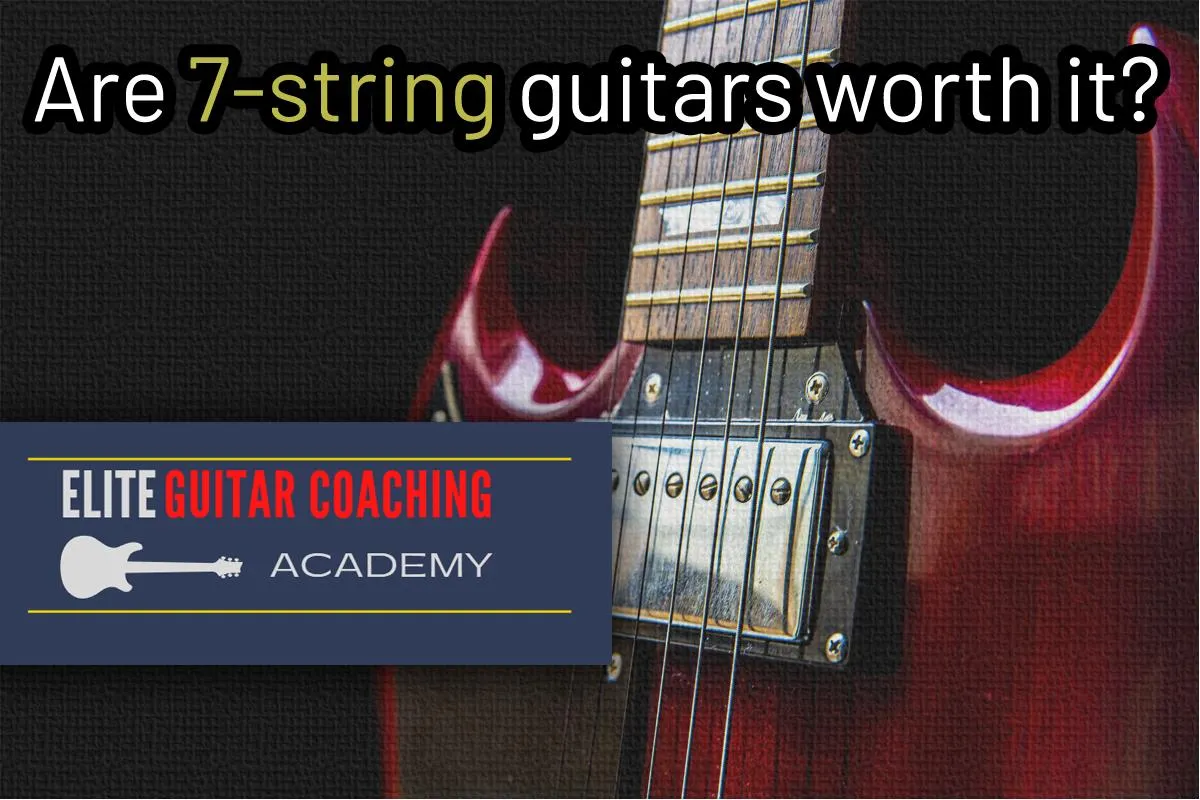Elite Guitar Coaching Academy Blog

Are 7-string guitars worth it?
Let me start by saying that I am not an expert on 7-string guitars, and the text below represents just my own opinion. I occasionally use 7-string guitars in my original recordings, but my main instrument will always be a 6-string guitar. Having said that here are some things to keep in mind from my perspective on 7-strings:
The main differences between playing 6-string and 7-string guitars are as follows:
Bending and Vibrato techniques: When playing a 7-string guitar, bending and vibrato can prove to be more challenging compared to a 6-string guitar. On a 6-string, ideally, you put your thumb over the neck to achieve proper bends and vibrato due to the limited width of the fretboard. However, on a 7-string, this becomes quite different, and more difficult in most cases. Due to the added width of the neck, only people with REALLY big hands can now use the same technique. Bends are now performed using finger movement in most cases, which is quite less optimal without the added strength from your thumb. As a result, two of the most important techniques of the electric guitar become significantly different to execute.
Muting: The next big challenge when discussing the differences between 6-string and 7-string guitars is muting. There are two main reasons why this is more challenging with a 7-string guitar.
a. The more strings you have, the more difficult it is to mute them. Even if you use the most advanced muting technique, which involves using the thumb for the lower strings and the rest of the fingers for the higher strings, you still have only four points of muting. So, if you have a 6-string guitar and can mute only four strings, one being the string that is being played, you need to mute five strings, which is relatively easy to do without much trouble. However, as I mentioned earlier, muting on a seven-string is much more challenging.
b. It is harder to mute heavier gauge strings. Why? Because you really need to exert effort to stop them from ringing. It is not an impossible task, but it is slightly more challenging.
In terms of chord shapes and scales:
Scales are not significantly more difficult on a seven-string guitar. They are pretty much the same.
Chords, on the other hand, become much easier. You have more positions on the fretboard to play your root notes and inversions, which makes playing in musical terms easier.
The main reason to use a seven-string guitar would be for a specific style of music you want to play, such as djent or any similar modern style, progressive metal, and the amazing chord melody style jazz guitar, in the style of George Van Eps or Ron Eschete. If you do not need it for these specific styles, then there is no use.
If you happen to be playing the styles mentioned above, then by all means, go for it. If it works for you, you can even make the seven-string guitar your main instrument.
Are there any differences between seven-string and six-string guitars in terms of sound?
From personal observations over the years of recording, I should say that 7-strings tend to sound a little better when recorded. This may be because of the extra wood in the fretboard and body. Another reason could be that most 7-strings do not have a tremolo system, which tends to make the sound thinner. In several cases, I have recorded the exact same thing using both, and the sound in most cases turns out slightly better when recorded with a 7-string guitar, even in cases where the 6-string is a more expensive instrument!
I hope this was helpful. You can watch the video below, where I explain this topic in more detail. If you’re interested in developing your guitar skills and reaching your music goals, please check the different Elite Guitar Coaching Academy packages and how you can get private coaching from me.

© Copyright - Elite Guitar Coaching Academy. All Rights Reserved - Privacy Policy - Earnings Disclaimer - Terms & Conditions
Earnings and income representations made by Elite Guitar Coaching Academy, eliteguitarcoaching.com, are aspirational statements only of your earnings potential. The success of Elite Guitar Coaching Academy testimonials and other examples used are exceptional, non-typical results and are not intended to be and are not a guarantee that you or others will achieve the same results. Individual results will always vary and yours will depend entirely on your individual capacity, work ethic, business skills and experience, level of motivation, diligence in sticking to Elite Guitar Coaching Academy's guidance and strategies, the economy, the normal and unforeseen risks of doing business, and other factors.
Elite Guitar Coaching Academy, and eliteguitarcoaching.com individually, are not responsible for your actions. You are solely responsible for your own moves and decisions and the evaluation and use of our products and services should be based on your own due diligence. You agree that Elite Guitar Coaching Academy is not liable to you in any way for your results in using our products and services. See our Terms & Conditions for our full disclaimer of liability and other restrictions.
Do you have questions? Are you wondering if this will work for you? Email us at info@mg.eliteguitarcoaching.com
We will be happy to discuss your goals and how our courses, coaching or consulting services may help you. Thank you.

